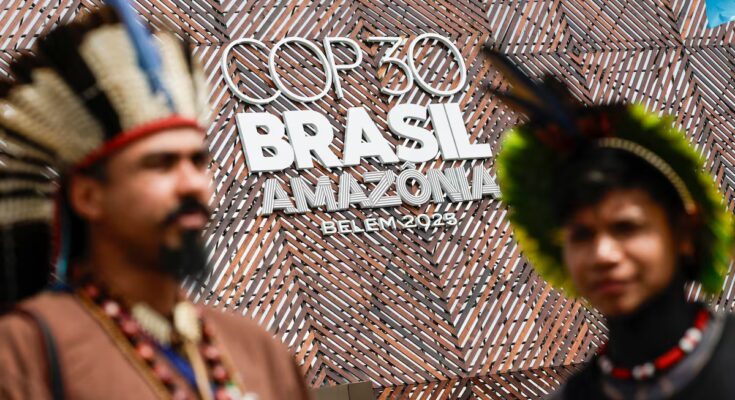After three consecutive years of climate negotiations hosted by authoritarian regimes, the return of the climate change summit to democracy could not come at a more decisive time. When world leaders gather in Belém for COP30 starting this week, they will do so in a country that has defied both authoritarianism and environmental collapse, a reminder that democracy triumphs where despotism destroys.
Only a few years ago Brazil was on the brink of collapse. Under the leadership of far-right populist Jair Bolsonaro, the Amazon has burned at an unprecedented rate as democratic institutions falter under relentless attacks. Bolsonaro has dismantled environmental agencies, cut the budget of environmental monitoring programs and ridiculed climate science. By 2021, deforestation in the Amazon had reached its highest annual level in a decade, and the world feared that the rainforest could pass an irreversible tipping point.
So Brazilians voted for a different future. President Lula da Silva returned to power with a promise to preserve both the environment and democracy. In less than a year, deforestation in the Amazon has decreased dramatically thanks to the reinstatement of environmental control programs and regulations. Brazil’s Federal Supreme Court later convicted Bolsonaro of plotting to stay in power after losing the 2022 election, a stark reminder that climate integrity and democratic integrity, in fact, feed off each other.
Now, as host country of COP30, Brazil is leading by example. Lula da Silva’s government has focused its presidency of the negotiations on three priorities that embody progressive values: strengthening multilateral cooperation; linking climate goals to social and economic transitions; and accelerate the implementation of the Paris Agreement. These are not simply diplomatic arguments, but a signal that democracies can still achieve and lead the environmental transition.
Progressive leaders who arrive in Belém will do so in the shadow of a dangerous global landscape. Around the world, far-right autocrats and populists are waging a coordinated attack on climate ambitions and democratic norms, exploiting legitimate economic concerns and using them against climate action. They present climate policy as an elitist project that destroys jobs, raises prices and weakens national sovereignty. At the same time, they defend the status quo of fossil fuels that benefits only some and harms many. The goal is not just to thwart climate policy, but to erode trust in democracy itself.
From Washington DC to Buenos Aires and Budapest, this has become the dominant narrative. In the United States, Trump has dismantled major climate initiatives while promising to drill oil relentlessly using his famous phrase “drill, honey, drill(drill, baby, drill.) In Europe, far-right parties are gaining ground with promises to repeal environmental regulations, arguing that they are protecting ordinary people from climate regulations.
Even leaders who are well aware of the climate crisis and should be speaking out are toning down their climate agendas, fearful of losing the working class vote to a populist backlash.
The result is a race to the bottom that puts at risk the fragile progress made under the Paris Agreement. The far-right’s message is deceptively simple: climate policy is too expensive. But this is false. Clean energy is now the cheapest in history. Renewable energy protects homes from fluctuations in the price of fossil fuels. Diversifying energy sources can improve the reliability of the electric grid and help consumers save money during periods of extreme heat and cold. And any delay in the energy transition worsens inflation and instability, rather than improving them.
The good news is that people still believe in progress. According to surveys conducted by Global Progress Action and Datapraxis, there is a strong demand for courageous, risk-taking leaders who can create real change in their lives. Furthermore, people continue to believe in democracy and reject authoritarian and irresponsible politics. People want policies that reduce their bills, protect their jobs, and strengthen their communities; and climate action can achieve all this, as well as ensuring a future for future generations. This is a progressive mandate that we should not ignore.
COP30 offers progressive leaders the opportunity to demonstrate that climate action drives growth and prosperity in democratic societies, rather than holding them back. The evidence supports this. In Spain, electricity prices have fallen by 50% since 2018 thanks to the growth of solar and wind energy. Globally, clean energy employment grew 3.8% in 2023, far outpacing the rest of the economy. Renewable energy systems strengthen communities’ resilience to extreme heat, storms and geopolitical crises.
As President Pedro Sánchez said at the 2025 Global Progress Action Summit, progressives must combat far-right discourse with facts, but also with a vision that demonstrates that a more accessible and secure future is only possible through climate action, and not without it. In Belém, progressives must make clear that climate leadership is a national force that produces results: cheaper energy, more jobs, and safer communities, while upholding the values that autocrats fear most: transparency, accountability, and solidarity.



